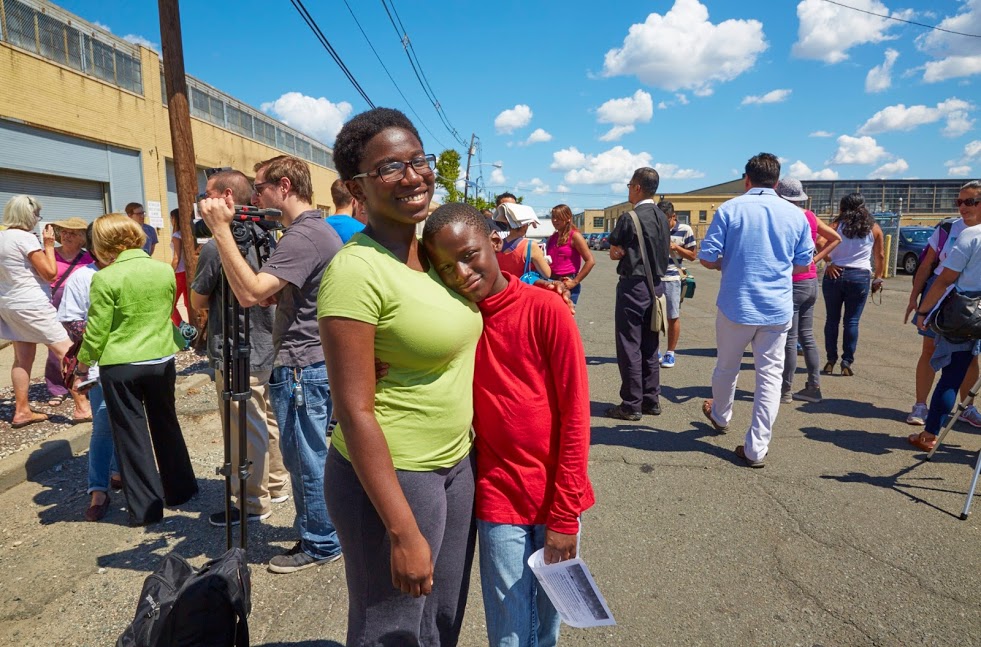
The author, Milca Kouame, and her brother Emmanuel. Loris Guzzetta / AFSC
By Milca Kouame
Milca Kouame is a 16-year-old high school student who was born and raised in Newark, New Jersey. Her parents migrated to the U.S. from the Ivory Coast in the 1990s. Her father was deported when Milca was seven years old, and she has not seen him since.
This week, Milca joins other young people and advocates on an AFSC-sponsored trip to Washington, D.C., where they will share their stories with members of Congress as they call for humane and compassionate immigration reform.
Here she writes about how her father’s deportation affected her family and her experience in advocating for immigrant rights:
I am the first American-born child in my family. I live with my mom, my little brother, Emmanuel, and my older sister, Adassa. My family is originally from the Ivory Coast in West Africa. My parents always told me they came to the U.S. because they wanted a better life for their children and themselves. When you’re in Africa, it can be hard to get by.
Growing up, no one told me how dangerous it is to live in the United States without your papers. No one told me about deportation and detention centers. Until I experienced it myself. I was 7 years old, and my brother was 3, when my father was deported. My mother couldn’t tell me what happened to him, only that he was going to jail for speeding—I didn’t understand how you could go to jail for something like that. It took my mother three years to tell Emmanuel and me that my father had been deported.
In that time, we lost our house in a fire. We had to live in our neighbor’s basement with other people, and it was a nightmare. My dad had been a bus driver, and it was hard without his income. My mom also lost her job as a nurse, and she had to do African hair-braiding to make a living. Sometimes she could make as a little as $30 a day.
It was very stressful for my mom. Very stressful. But it was also very stressful for me. I was being bullied in school. My mom couldn’t really take care of me because she had to work so much, and I was home alone a lot. When my dad was deported, my brother was having a hard time speaking, and even today, he still struggles with that.
My mother took me to AFSC for the first time when I was 9 years old. They encouraged me to tell my story and show Congress that immigration also affects children. When I was around 12 years old, I visited Washington, D.C. with AFSC’s advocacy team for the first time, and it was a nerve-wracking experience because I had never spoken in front of a crowd of people before—let alone representatives and reporters. It started to give me confidence to share my story with more people.

Today my family is 100,000 percent better than we used to be. We live in a real small apartment, but it’s OK, because we live by ourselves and it’s ours.
I don’t get to speak with my father much. I don’t really know where he is; I don’t really remember what he looks like—it’s been nine years since I saw him. Even when I do talk to him, we can’t have a normal father-daughter conversation because he doesn’t really know me anymore.
When I meet with representatives in Washington, D.C. this week, I want them to understand that deportation doesn’t just affect immigrants. It affects the families they’re leaving behind. As a child, when someone leaves you—or they’re taken away from you—you’re traumatized, like it’s on you, like you did something wrong. It’s not right to take a parent away because they are the people who build who the children are. When you take mothers and fathers away, it breaks us down.
Immigration is not something that we can only talk about. We have to take action on the issue of immigration because it affects millions of lives. This is the reason why we are going to D.C. This trip, like other trips we made before that, is very important. Congress needs to know the concerns of their constituents. By having a face-to-face conversation with them, I believe that we can start to change everything.